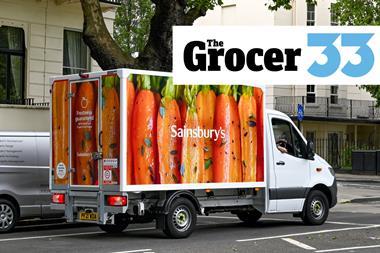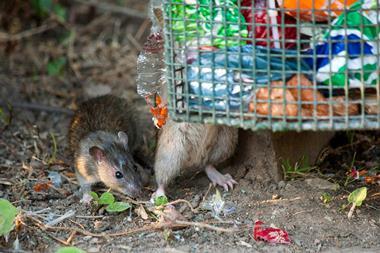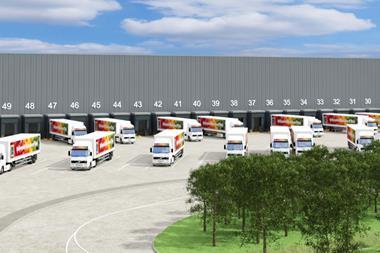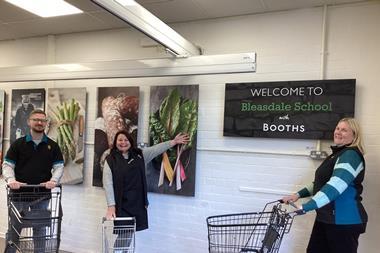analysis by Sarah Hardcastle
- innovate your way out of deli decline
- pre-pack banishes counter queues
- food to go builds the margins
The choice of TV chef Jamie Oliver to front Sainsbury's Try Before You Buy TV and in store campaign is more than an attempt to bask in reflected glory shed by the media star of the moment.
Oliver's youthful, energetic image is clearly designed to draw younger consumers to the deli counter where sales are in decline.
The younger shoppers are being lost to pre-pack, and Oliver's mission is to tell them the deli counter has exciting goodies to offer.
Sainsbury is not alone in its concerns about falling deli counter sales. Retailers everywhere are worried about the decline, most apparent in traditional cooked meats, such as ham, and English cheeses.
The reason is that the average deli shopper is in the 45-plus age group, while the younger generation prefers to buy pre-pack because it's more convenient and less time-consuming than counter-queuing.
Pre-pack, which is booming in contrast to counter sales, has also become more attractive because of the increase in the number of premium products in this format.
The trend stretches right across Europe, according to managing director Sophie Madrangeas of French cooked meats and charcuterie producer Madrange.
"Deli counter sales are declining all over Europe and in the US. It's a mature market. People are not prepared to queue and counter staff lack sufficient product knowledge to sell the products properly. Our pre-pack sales are increasing far more quickly than deli sales."
The challenge for retailers and suppliers is how to stop the flow, and many solutions are being proffered.
One idea is the "deli express" which entails pre-slicing popular choices of cooked meat and cheese, wrapping them in deli packaging and selling them in a "ready to go" section of the deli counter.
"It enables customers to get deli quality products, but reduces the time taken to be served," says national account manager Alex Webster of Cranswick Country Foods, which does a range of hams and sausages.
Madrange has developed the concept with a pre-pack variation for cooked meat which it calls Ultra Fresh.
Madrangeas explains: "The packaging looks like deli packaging, but has product information, weight and price an important point for customers. We recommend it's merchandised alongside or at the beginning of the deli counter. Ultra Fresh is well established in Spain and in Belgium, and it is starting to develop in France." The company is now promoting the format here where Madrangeas estimates it could account for up to 20% of all deli ham sales in the next three years. "It works with the deli counter, freeing up space for more premium, added value products," says Madrangeas.
Providing more space for premium, continental, added value and regional speciality cooked meats certainly seems to be one way to regenerate the deli.
Danish Deli says UK volume sales of loose deli continental meats (estimated at 3 million kilos), have risen 15% (12 months to March 2001), while pre-pack (5 million kilos) rose 3%.
Marketing manager Pia Jensen adds: "While our sales have moved towards pre-pack, deli sales of salami and pepperoni haven't slipped, indicating a growing demand for this type of product."
This is endorsed by leading Italian charcuterie brand Fiorucci which also provides a one-stop shop for smaller retailers with its range of German, French, Danish and Spanish meats.
Managing director Joe Zottola says the way to boost deli sales is to stock a greater variety of premium, continental products, including a range of regional specialities. "Consumers are becoming more adventurous, demanding authentic regional specialities and products with a point of difference.
"At one time the multiples only stocked a couple of salamis, now they're offering a much wider range. Our volumes have gone up considerably as a result."
Fiorucci's best seller is parma ham, followed by Italian roast ham, and Milano in the salamis, says Zottola.
Cheese, which has fallen dramatically, mainly because of the drift to pre-pack, faces many challenges: the "yellow brick wall" of slabs and rounds which detract from presentation, too much choice, consumer confusion over the expanding range of additive cheeses, and over promotion of popular varieties to the detriment of less well known types. Added to this, there's the lack of counter staff knowledge and handling skills. Of the different types, cheddar is showing the sharpest fall, followed by regional cheeses, blue cheese and soft continentals. Hard continentals is the only type showing loose sales growth.
Cheddar producers are taking steps to redress the situation. Dairy Crest is heavily promoting its Cathedral City in store and on TV, having achieved a significant increase in household purchase in the past year. North Downs Dairy has given its Pilgrims Choice vintage cheddar a boost with a new oak smoked Smokey variety.
To boost counter sales generally, suppliers such as the Bfd Group and Bradbury & Son recommend stronger product differentiation. "A wider, constantly changing selection from UK regions and abroad encourages trial, and generates continued demand," says BFD marketing manager Vera Malhotra.
{{FOCUS SPECIALS }}
Close menu
- Home
- Retail & Wholesale
-
Products & Suppliers
- Back to parent navigation item
- Products & Suppliers
-
Product Categories:
- Back to parent navigation item
- Product Categories:
- Alcoholic drinks
- Bakery
- Cereals & breakfast
- Cheese
- Chicken & poultry
- Chocolate
- Confectionery
- Crisps, nuts & snacks
- Dairy
- Fish
- Fresh produce
- Frozen
- Household
- Meat
- Own Label
- Sauces & condiments
- Seasonal
- Soft drinks
- Vaping
- Vegan & plant-based
- World foods
- Suppliers
- People
- Reports & Data
-
Topics A-Z
- Back to parent navigation item
- Topics A-Z
-
Popular topics:
- Back to parent navigation item
- Popular topics:
- Cost of living crisis
- Crime
- Deposit Return Schemes
- Finance
- Government & Regulation
- Health
- Inflation
- Loyalty
- Marketing
- Mergers & Acquisitions
- New Product Development
- Sourcing
- Supply chain
- Sustainability & environment
- Technology
- Ultra Processed Foods
- Vaping
- A-Z all topics
- Content by type:
- Events
- Ask iA (beta)
- Subscribe now
Sign in to comment on this article
Not logged in before? Register for FREE guest access today.
You will be able to:
- Read more stories
- Receive daily newsletters
- Comment on stories
Advert

















No comments yet